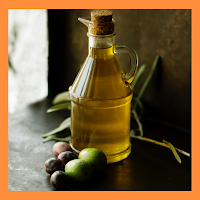
As well as your rainbow plate there are some other nutrients that are essential.
Ideally, a significant proportion of your energy comes from the fat content of your diet rather than from high glycaemic carbs [refined wheat, potatoes, white rice etc] because these cause high sugar peaks after consumption. The best oil and fat choices are healthy and good for you. The demonisation of fat in the last century is now recognized to be completely misleading and one of the causes of our current obesity epidemic. I will use ‘fat’ to mean oil or solid foods.The wrong story about fats
The internet will still tell you that animal, i.e. saturated fats are ‘bad’ but this is based on out of date opinion from 50 years ago. Saturated fats are beneficial in many ways (1.) and certainly shouldn’t be avoided.
So to put it simply for you, there is one bad fat, one eco-unfriendly fat, some neutral fats and some with health benefits. The bad fat is artificial trans fat, the eco-unfriendly fat is palm oil and the best nutritional ‘must have’ options are olive, rapeseed and nut oils because of the polyphenols they contain.
Butter and coconut oil are good for taste and if you like roast meats and an occasional helping of roasties cooked in dripping or goose fat then that is absolutely OK.
Grapeseed oil, peanut oil and sunflower oil are good for cooking and there is nutritional value [at a price] in avocado, hemp and argan oils for example. Best avoid ‘vegetable’ oil as you won’t know what it is.
Trans fats
These hydrogenated modifications of vegetable oils increase shelf life, which is useful commercially, but they increase the risk of cardiovascular disease, Alzheimer’s and cancer.
They are listed amongst the emulsifiers in food or as ‘partially hydrogenated oils/fats’ or ‘shortening', in fast foods and commercial baked goods, such as cakes, cookies and pies, microwave popcorn, frozen pizza, some refrigerated doughs, such as biscuits and rolls, fried foods, including french fries, doughnuts and fried chicken, non-dairy coffee creamer, and stick margarine.
Trace elements
Some vital foodstuffs are only needed in small quantities: essential trace elements are boron, cobalt, copper, iodine, iron, manganese, molybdenum, and zinc. Probably essential trace elements include chromium, fluorine, nickel, selenium, and vanadium. We have previously talked about magnesium. They are important in cellular processes, immunity, and brain function.
Getting all these requires substantial food variety [the rainbow plate] but also spices, seeds, nuts and good fats. I encourage you to have ‘sprinkles’ that you add to each food plate. These are like the Middle Eastern mix ‘Dukkah’ if you like. A few walnuts, chopped roasted hazelnuts, nigella, cumin, sesame or sunflower seeds, and various peppers are all good additions.
Best "Nots"
There are 2 things you would really want to avoid if you are keen to have a long HealthSpan.
Deadly sugars
John Yudkin’s book ‘Pure, White And Deadly’ [1972]. Remains a good guide today: it is not about cocaine, his ‘white death’ was sucrose, common or garden sugar. The most dangerous component is fructose, which is present in pure form in fruit juices. Best to skip these and eat whole fruit every time. More about sugar and sweeteners, next week.
UPF’s
Many processed foods like dark chocolate, raw milk, cheese, yogurt and other fermented products are decidedly healthy. But factory-made products with large numbers of ingredients and chemicals – on or off the label, generally damage our health.
The problem is that they typically contain little or no whole foods, are ready-to-consume or heat up, and are fatty, salty or sugary and depleted in dietary fibre, protein, various micronutrients and other bioactive compounds plus contain endless emulsifiers, preservatives and colour and flavour ‘enhancers’ that are potentially toxic. Sorry – walk away from the ‘ready to heat up’ food aisle.
You may have heard about the effects of an experiment where someone ate nothing but MacDonald’s foods for a month. Depression, significant weight gain, bad skin … no need to say any more.
1. J. L. Heileson, ‘Dietary saturated fat and health disease: a narrative review’, Nutrition Reviews (2019); 78(6):474–485

No comments:
Post a Comment